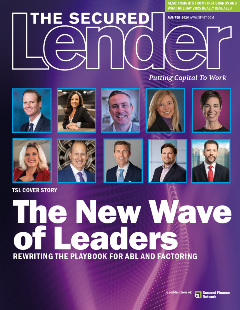
Tom Floyd
Managing Director, Regions Business Capital
40 Under 40 Category: Portfolio Management
Biography:
Tom Floyd is a managing director with Regions Business Capital, a division of Regions Bank. He manages an ABL and leveraged cash-flow relationship-management team in Dallas, Texas and has been with Regions since 2014. Prior to Regions, Tom was with JPMorgan for three years and Wells Fargo (and its predecessors) for 12 years. While the majority of his career has been spent in asset-based lending, Tom also has commercial banking and leveraged finance experience.
Tom has an undergraduate degree from Wofford College and an MBA from Southern Methodist University, where he finished at the top of his class.
Originally, from South Carolina, Tom lives in Dallas, Texas with his wife, five-year-old daughter and seven-year-old son. He is a wine collector and loves all things related to food and cooking.
How did you wind up in the industry? We know most kids don’t say “I want to be in commercial finance when I grow up.”
During my senior year at Wofford, I was seeking finance positions in large corporations and wasn’t even considering banking. I was contacted by a recruiter with First Union in Charlotte, NC who had a position in First Union’s ABL group. At the time, Charlotte wasn’t a city I really wanted to relocate to, but decided to drive up for an interview anyway since, at worst, it would be additional interview experience. I really liked the people I met and ultimately made a gut decision. While I attempted to learn more about asset-based lending ahead of and during the interviews, it turns out I didn’t have a clue. It didn’t take long after starting, though, to discover one of the main things I like about this industry- that the companies range across numerous spectrums with regard to industry, size, life cycle stage, ownership, credit risk, etc. If nothing else, this one attribute keeps things interesting every day.
What is the best professional advice you have been given and how have you implemented it?
One of the earliest pieces of professional advice I was given related to work ethic. A senior leader in my group explained to me that there isn’t any rocket science in what we do and that all it takes is hard work and some drive. He was also fond of saying “you don’t have to be the smartest person in the room, but you do have to be in the room”. By that he meant that, if you want to be successful, you have to be visible and engaged. You have to ask questions, volunteer for projects and always treat your job description as a bare minimum set of requirements. In the first few years of my career, my group was working on a large project and, I along with a few others, were tasked with providing a very specific piece of analysis. This happened to be late in the day and my co-workers finished their assignment and sent it to the person running the project and quickly left for the evening. I took my portion of the work into the conference room where they were assembled and quickly explained my methodology and assumptions and then starting asking how this fit into the bigger project as well as what I could do next. This led to me taking on a much larger role in the project and worked on it to its conclusion. I have passed this advice along to many young bankers with an addition that all of these things are critically important during the first few years of a career when people are assessing potential.
What role has mentoring played in your career?
I have had numerous mentors, both formally and informally, over the years but one particular experience was very valuable. While in business school, I considered moving to an entirely different industry and leaving the banking world behind. I sought out and found a mentor in the industry I was considering and met regularly with him for a period of around six months. I went into the relationship with the goal of learning how to facilitate a career move into a different industry but the result was entirely different. My mentor really challenged all of my assumptions about the industry and myself. After a lot of honest discussion, we both came to the conclusion that I should stay in banking/finance. This experience and my mentor’s wisdom likely saved me a tremendous amount of turmoil and also reinvigorated my interest in banking.
The Secured Lender

SFNet's The Year Ahead Issue


